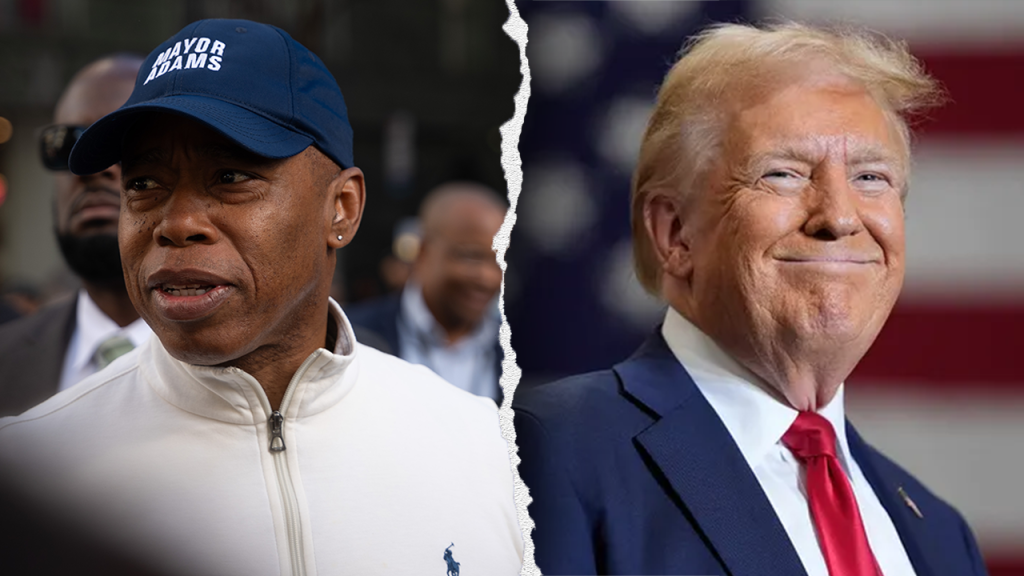Former President Donald Trump’s statement regarding a potential pardon for New York City Mayor Eric Adams, currently under federal investigation for corruption and bribery, has ignited a whirlwind of speculation and controversy. Trump’s assertion that he would “certainly look at” pardoning Adams, coupled with his dismissal of the allegations against the mayor, underscores the complex political landscape and highlights the potential for presidential pardons to become embroiled in partisan disputes. Adams is accused of soliciting illegal campaign contributions from foreign entities, falsifying records to conceal these transactions, defrauding taxpayers of a substantial sum, and accepting lavish vacations funded by foreign benefactors.
Trump’s public contemplation of a pardon for Adams, while acknowledging a lack of familiarity with the specific details of the case, raises questions about the criteria he might employ in exercising his pardon power. His characterization of Adams’ alleged acceptance of travel upgrades as commonplace and insignificant further complicates the matter. By downplaying the seriousness of these allegations, Trump seemingly minimizes the potential legal ramifications and potentially sets a precedent for future considerations of pardons in similar circumstances. This raises concerns about the potential for abuse of the pardon power and its impact on the integrity of the justice system.
The former president’s suggestion that Adams is being targeted due to his stance on illegal immigration adds another layer of complexity to the situation. Trump’s claim that he predicted Adams’ indictment, followed by his actual indictment months later, creates an impression of political persecution, further fueling the narrative of a politically motivated investigation. This narrative, whether accurate or not, can significantly influence public opinion and potentially impact the outcome of any legal proceedings against Adams. The confluence of these factors creates a highly charged political atmosphere surrounding the case.
Adams’ recent meeting with Trump’s pick for border czar, Tom Homan, adds intrigue to the unfolding narrative. This meeting, ostensibly focused on the migrant crisis, occurred against the backdrop of the federal investigation into Adams. The mayor’s characterization of the meeting as “productive” and his emphasis on shared goals with Homan could be interpreted as an attempt to build bridges with the Trump camp, potentially bolstering his case for a future pardon. The timing of the meeting and the public statements following it inevitably fuel speculation about a possible quid pro quo or an attempt to curry favor with the former president.
Adams’ vehement denial of any wrongdoing and his avoidance of direct questions about aligning himself with Trump for a potential pardon underscore the delicate political tightrope he is walking. His public statements reflect a strategy of defending his innocence while simultaneously attempting to distance himself from any perception of seeking political favors. This delicate balancing act highlights the precarious position Adams finds himself in, navigating the complexities of a federal investigation while simultaneously managing the political fallout from his association with a controversial former president.
The potential pardon of Mayor Adams by former President Trump presents a complex intersection of legal, political, and ethical considerations. Trump’s stated willingness to consider a pardon, despite lacking a full understanding of the case details, raises concerns about the potential politicization of the pardon power. His downplaying of the allegations against Adams, coupled with his suggestion of politically motivated prosecution, further muddies the waters. Adams’ meeting with Trump’s border czar and his subsequent public statements add fuel to the speculation surrounding the case, creating a narrative ripe with political intrigue. The mayor’s persistent denial of wrongdoing, juxtaposed with his cautious avoidance of direct questions about seeking a pardon from Trump, highlights the precariousness of his situation. The unfolding events surrounding this potential pardon will undoubtedly continue to be closely scrutinized, with implications extending far beyond the individuals involved. The case underscores the importance of transparency and impartiality in the exercise of presidential pardons and the potential for such actions to become entangled in the web of political maneuvering.

